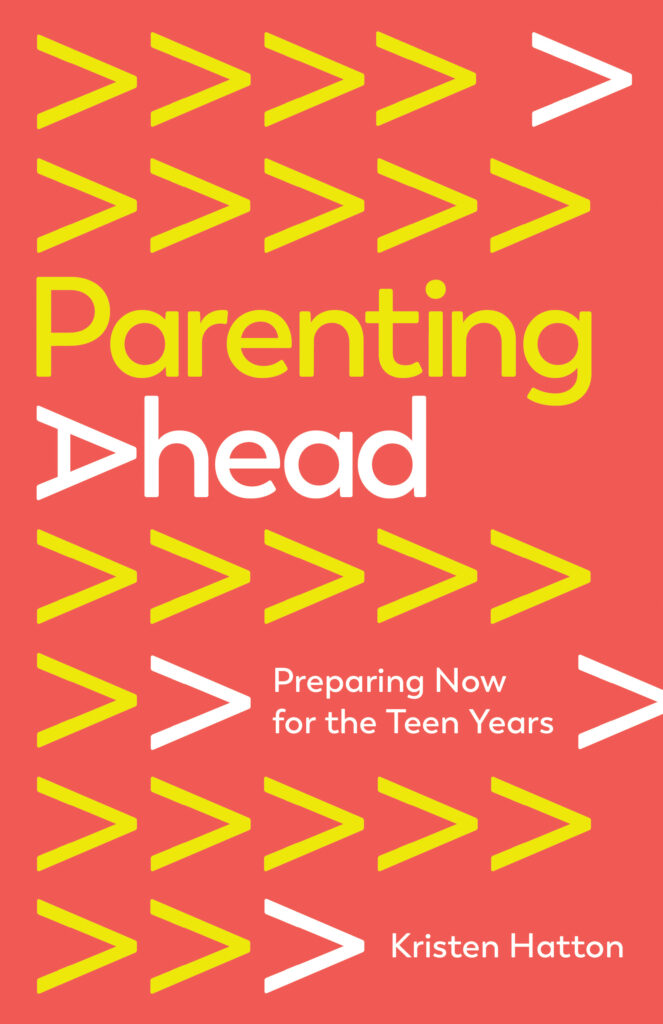When my oldest child was a high school senior, I did not realize how closed off she had become toward me. Yes, I knew I drove her crazy with all my reminders of things she needed to take care of. Even I felt like a broken record at times. But when I walked by her room and saw her laying around watching Netflix and on her phone with her friends, and I knew how much she had to do, my reminders seemed necessary. Also necessary, so I thought, was the “need” to circle back around later, sometimes just an hour later, to check on her progress—or remind her again to get busy! The solution to the stress and anxiety she complained of seemed simple to me: stop procrastinating!
Eventually, my daughter shared how my “nagging” (let’s just call it what it is) only served to increase her anxiety, not free her from it. Instead of helping her get going, my nagging was further paralyzing her. She feared what my words communicated to her must be true—I didn’t think she could manage her life at college without me. Certainly, I did not think this was true.
However, it took a friend drawing an illustration before I could see how my habits of “helpfulness” were suffocating her. My gracious friend then gently encouraged me to stay outside of her bubble unless invited in. Her exact words, I believe, were, “Stop popping her bubble!” Her words opened my eyes to the truth that my nagging was doing the opposite of encouraging her; instead it was provoking her. The very thing that Paul warns parents not to do (Colossians 3:21). No wonder she felt so beaten down.
This is hard for us parents, isn’t it? We believe good parents are supposed to “help” their kids. As with me and my on-the-way-to-college daughter, our reason for inserting ourselves is likely the simple desire to prevent unnecessary trouble and to help our kids be successful. But could it be that mixed in with our good intentions, the measuring sticks of their happiness and success are guiding our behavior?
While our intervening may—in the short run—assist in securing our “hopes” for our children, in the long game of life our kids are negatively impacted. Interestingly, as different as helicopter parenting is to hands-off permissive parenting, kids with both types of parents experience many of the same adverse outcomes. So, before we move into analyzing our own motives, or the root beneath why we do what we do, let’s take a closer look at two pervasive parenting styles and the effects of each on our kids. I will refer to what is often described as helicopter parenting as overparenting and permissive parenting as under-parenting.
Overparenting
Parents in this category tend to be warm, supportive, and responsive.1 These are undeniably positive qualities that enable children to thrive. But when these are coupled with a high level of control, parents exhibit too much responsiveness and overinvolvement for what is appropriate for their child’s age. Consequently, children are given little opportunity to develop autonomy. Over the years this type of parenting may include things like:
- Being overinvolved in your child’s social life, e.g., calling the parent of the girl who didn’t invite your daughter to her party.
- Being overinvolved in “defending” your child, e.g., asking the school principal to address the teen who gave your teen a dirty look; going to social media to publicly build your case against the teacher, coach, business who “wronged” your child.
- Being overinvolved in your child’s day-to-day athletics or schooling, e.g., demanding the coach play your son or a teacher give your child an assignment redo or deadline extension.
- Being overly restrictive, e.g., trying to keep your child from all infiltrations of the “world” (I’ll elaborate on this later as there is a lot of room for differences here).
- Being overly protective, e.g., trying to anticipate every possible safety issue your child may encounter. (Please hear me: it is our job to keep our kids safe but preventing our child from playing soccer because he might get hurt or demanding the city park cover the playground in foam to keep our kids from a bruised knee if they fall are examples that would qualify as excessive intervention.)
If we don’t keep ourselves in check, over time, we might become the parents who reach out on behalf of their college kid to question a professor about a grade and intervene in their young adult children’s job interviews! I know this sounds absurd, but these things really do happen. Such behavior follows the pattern formed from many years of intrusiveness.
There are smaller, daily occurrences that fall under the overparenting category too. Doing things for your children they should be doing for themselves including, micromanaging homework, tying shoes, making their bed, and then continuing to do for your teen things they are able to do on their own, like make lunches, do the laundry, schedule appointments, and talk to waiters or sales associates. Now you may be thinking, Well, I do the laundry, what’s wrong with that? For the most part, I do too. But when my youngest was in high school, there were times when he needed something washed, not on a regular laundry day, when I had other things going on. Rather than me rearranging to accommodate his last-minute need, how much better for me to teach him how to do it himself.
The Result of Overparenting
One of the primary problems that stems from overparenting is that our kids don’t learn how to navigate circumstances, challenges, and conflict for themselves. Instead of troubleshooting alongside our kids so they learn how to handle things on their own, we take charge, leaving them ill-equipped, insecure, and dependent on us. To a large degree, the rise in college students who feel stressed out and anxious is attributed to the underdevelopment of coping skills and self-efficacy because so many parents have made it a habit to always step in.2 Furthermore, these young adults exhibit more depressive symptoms and an overall dissatisfaction with life. The very things a parents’ control is meant to help their children attain—happiness and success—are the very things these kids lack!
Other implications of overparenting show up in our kids as entitlement and narcissistic traits. Grandiose behaviors, often displayed through dominating extroversion and arrogance, are commonly associated with narcissism. But there is another type of narcissism, the vulnerable narcissist who presents with low self-esteem, anxiety, and depression. These traits are more often seen in someone who has been overparented. However, like the more easily recognized narcissist, both types of narcissists feel entitled to special treatment. Young adults who have grown up with a parent’s excessive involvement are accustomed to the world being all about them. Their parents have always been there to meet their every need, resolve every difficulty, and eliminate any roadblock that threatens their well-being. Out in the world, on their own without everyone catering to them, these overparented young adults keep demanding attention from a world that is not that interested.
When children don’t learn to deal with life’s difficulties and their own failures, they become more dependent on others for their sense of self and worth. As believers in Christ, our worth is secure in him, and yet our sin nature leads us to continue struggling to rest in our infinite, God-given worth. For this reason, we try to attach our identity to false sources or worth—things like our achievements, appearance, wealth, our kids’ successes, popularity, others’ opinions, and more—to feel good about ourselves or feel our worth. For the young adult, who has not been given the opportunity to become independent, the sinful seeking to know their worth is intensified. Just consider how insecurity and the feeling of being incapable might lead an individual to be hypersensitive to criticism and, in turn, crave special treatment. Is it any wonder this person looks for constant affirmation from others to feel better about him or herself?
While I hear moms joke about being helicopter parents, the result is no laughing matter. If you are concerned that you might be on that path, remember there is a reason we looked first at the hope we have in Jesus. But how this book differs from secular books on the perils of helicopter parenting is that we are going to look at why we are bent toward control. Only then can we repent and ask for Jesus’s help to calm our over-anxious, controlling hearts. But first, under-parenting.
Under-Parenting
The term under-parenting sounds like it would be a parenting style that no “good” parent would fall into. But my use of this term does not refer to neglectful or uninvolved parents. I am also not using the term, as some do, as an antonym to overparenting which encourages parents to give up the overinvolvement and micromanaging of overparenting. Certainly, under-parenting in that context has it merits. But for the purposes of this book, under-parenting refers to a permissiveness exhibited through failure to exert parental authority, set and enforce limits, and overall abdicate our job of shepherding kids.
Like parents who tend toward over-controlling involvement because they want good things for their child, the under-parenting parent is also warm and responsive because they too want good things for their child. However, their desire for the kids to be happy and for them to have a good relationship results in giving their kids what they want. Examples of under-parenting over the years might include:
- Giving children the freedom to do as they please by setting few or no limits and household rules.
- Doling out money, material goods, and experiences regardless of financial means, such as freely handing
- out money for social plans so your child isn’t left out.3
- Ignoring unruly behavior, for example in a restaurant when a child is disrupting other diners.
- Believing your children without question, such as their claim they didn’t do something (that they actually did) and casting blame on someone else.
- Making excuses for your children, such as justifying why they did or didn’t do something they should/shouldn’t have.
A belief behind this permissive or indulgent style of parenting is that happy children lead to conflict-free, happy households and good parent-child relationships. Who can blame these parents? That sounds like something we would all like.
Also similar to overparenting, under-parenting begins in a rather benign way. For example, a parent at the park who gave into her child’s whining for a snack. As an isolated event, this situation doesn’t appear to be any big deal, but after years of indulging a child’s every whim, the unwillingness to say no or impose limits on behavior and choices leaves these children vulnerable to entitled thinking. All because we want our kids to be happy, to not miss out, and to think of us as their best friends.
The Result of Under-Parenting
Contrary to our “good” desires that lead to over or under-parenting, children who grow up in either type of home are both prone to anxiety, depression, low self-efficacy, and inadequate coping skills as young adults. Furthermore, a lack of self-control, low perseverance, feeling helpless and becoming easily frustrated are more apt to develop when a mother is materialistically or relationally indulgent with a child.4 And in the case of separated or divorced parents, when a mother or father emotionally copes by catering to the kids, adolescents become even more vulnerable to the adverse effects of under-parenting.5
Research also shows that under-parented adolescents are more prone to outwardly sinful behavioral issues, such as drinking, substance use, sexual promiscuity, and criminal activity.6 While other adolescents can find themselves on destructive paths with these same behaviors, children accustomed to doing or receiving whatever makes them happy without limits or boundaries are, in a sense, handed over to lifestyles of overindulgence, excess, and entitlement.
There is much talk today about entitled kids, but do we see how we contribute? When we cater to special treatment and the belief that they have a right to do what they want when they want, we spoon-feed a self-centered, deserving attitude. This is especially visible in upper middle-class homes where kids expect certain designer labels, vacations, and other privileges. But certainly, entitlement is not limited to these households or to this form. One way you might not have thought about entitlement showing up is in the high percentage of young adult males indicted in sexual assault cases on college campuses.7 According to one journal article, “these youth are more likely to develop expectations that their needs take priority over the needs or concerns of others and a desire for immediate need gratification.”8 Entitlement is identified as a major factor leading young men to believe they deserve sexual pleasure without the consent of the other person. Of course, this is not the only factor, but the entitlement leading to sexual assault is evidenced in under-parented children as well as overparented children. As discussed previously, when a child grows up in the center of their parents’ world with everything done for them, they come to expect that they should get what they want when they want it.
These adverse outcomes are hard to take in and certainly not what we imagine will be the result of what we think of as helping our children. But the adverse outcomes are not limited to our children—they also affect us. Just as similar outcomes in underparented and overparented adolescents have been noted, similarities are evidenced in both types of parents. Stress, anxiety, depression, and overall negative well-being characterize both.9 I know none of us would deliberately bring more stress into our lives! And certainly, we don’t want to feel depressed or have our children depressed. Yet when we veer toward overparenting or under-parenting, we bring it all on.
- Nathan A. Winner and Bonnie C. Nicholson, “Overparenting and Narcissism in Young Adults: The Mediating Role of Psychological Control,” Journal of Child and Family Studies 27, no. 11 (2018): 3650–57.
- Chris Segrin et al., “Parent and Child Traits Associated with Overparenting,” Journal of Social and Clinical Psychology 32, no. 6 (2013): 569–95.
- Ming Cui et al., “Parental Indulgence, Self-regulation, and Young Adults’ Behavioral and Emotional Problems,” Journal of Family Studies 25, no. 3 (2019): 233–49.
- Ming Cui et al., “Parental Indulgence: Profiles and Relations to College Students’ Emotional and Behavioral Problems,” Journal of Child and Family Studies 27, no. 8 (2018): 2456–66.
- Sarah N. Wolford et al., “Examining Parental Internal Processes Associated with Indulgent Parenting: A Thematic Analysis,” Journal of Child and Family Studies 29, no. 3 (2020): 660–75.
- Cui et al., “Parental Indulgence, Self-regulation,” 233–49.
- Evin W. Richardson, Leslie G. Simons, and Ted G. Futris, “Linking Family-of-Origin Experiences and Perpetration of Sexual Coercion: College Males’ Sense of Entitlement,” Journal of Child and Family Studies 26, no. 3 (2017): 781–91.
- Richardson, “Linking Family-of-Origin Experiences,” 782.
- Ming Cui et al., “Indulgent Parenting, Helicopter Parenting, and Well-being of Parents and Emerging Adults,” Journal of Child and Family Studies 28, no. 3 (2019): 860–71.
Excerpted from Parenting Ahead: Preparing Now for the Teen Years © 2023 by Kristen Hatton. Used with permission of New Growth Press. May not be reproduced without prior written permission.
parenting Ahead: Preparing Now for the Teen Years
Parenting Ahead helps parents with younger children build a foundation for their family based on biblical principles for the teen years to come. Readers will learn to practice redemptive parenting where their children grow to see the world through a gospel lens based on biblical truth.






